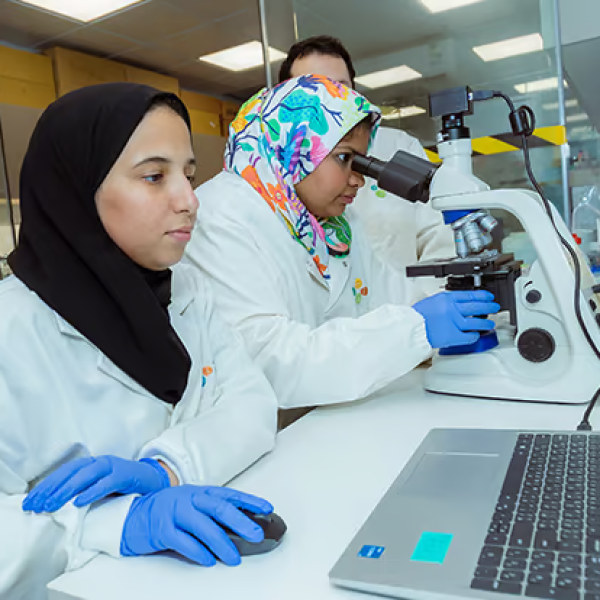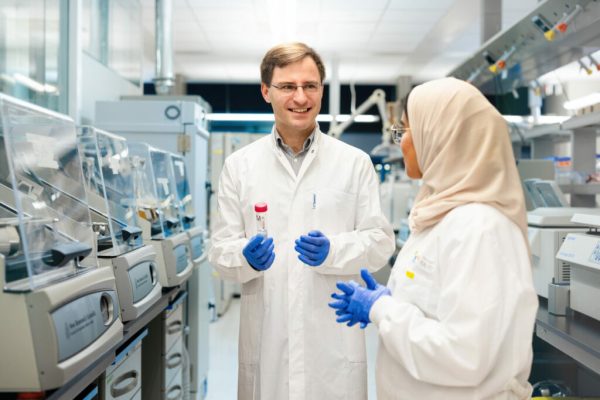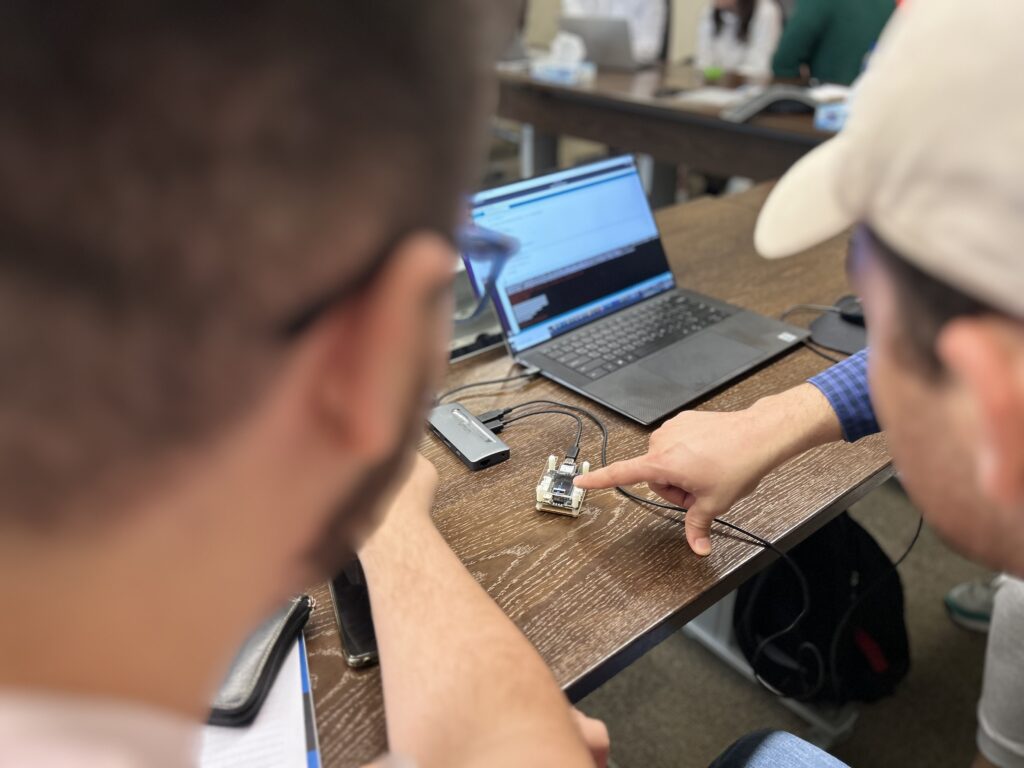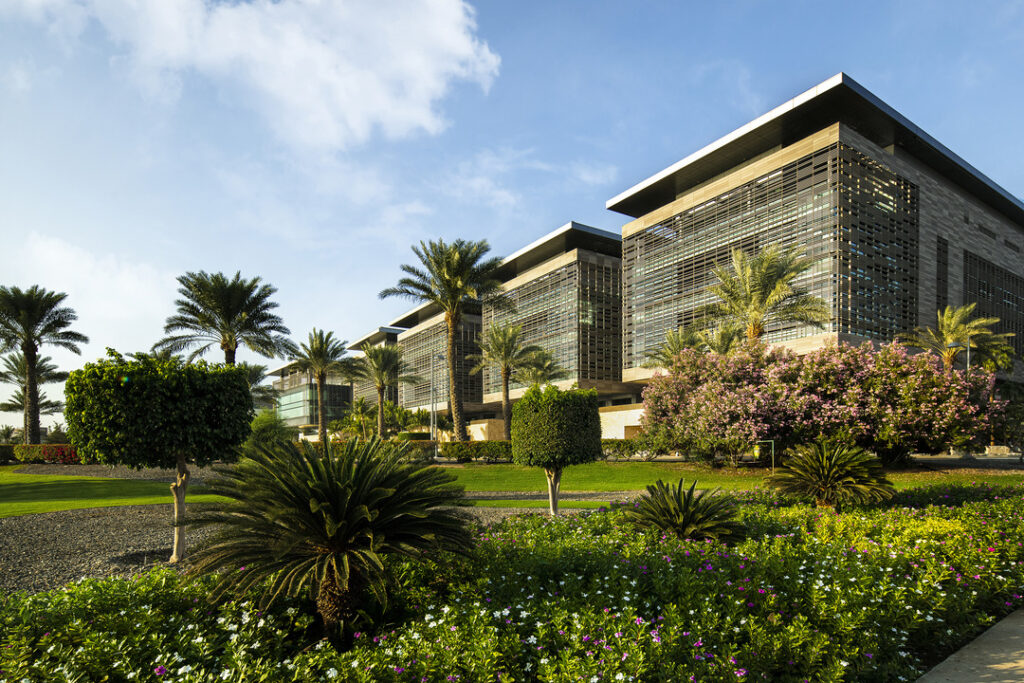Science & Engineering Track
This track is designed for those who have a keen interest in scientific exploration, engineering solutions, and maintaining state-of-the-art facilities to support groundbreaking research and innovation.
Opportunities
Facilities Management
Core Labs
Research
Center of Excellence
Facilities Management

Overview
This opportunity is designed for engineers or architects interested in working on major development projects.
Qualifications
- Degree: BA or MA in Mechanical Engineering | Electrical Engineering | Construction Management | Architecture
If you are skilled at using MS Office and are able to perform engineering analyses and design, this opportunity is for you.
Opportunities
Campus & Community is responsible for planning, developing, and overseeing projects across KAUST’s facilities. The department delivers innovative and modern solutions to enhance productivity and improve quality of life on campus.
Trainees in this department will support quality control and assurance for KAUST projects, ensuring compliance with KAUST Design Standards. They will engage with clients to capture project needs, conduct site visits, and translate requirements into written scopes of work. Responsibilities include reviewing contractor submittals, contributing to the design and execution of MEP/civil systems, and providing feedback on execution plans. Trainees will also oversee commissioning activities, collaborate with Facilities Management and other stakeholders, and identify areas for improvement within their placement.
Degree Required: BA or MA in Mechanical Engineering | Electrical Engineering | Construction Management | Architecture
Core Labs
Overview
This opportunity is designed for those interested in working in one of KAUST’s Core Labs, which support the scientific goals of the University, Saudi Arabia, and the global research community.

Qualifications
- Degree: BA or MA in Chemistry | Physics | Biology | Electrical Engineering | Electronics Engineering | Chemical Engineering | Mechatronics | Mechanical Engineering | Industrial Engineering
- GPA 3.4/4 or 4.25/5
If you are skilled in MS Office, product prototyping, coding, system design
Opportunities
Nanofabrication Core lab
Analytical Chemistry Core Lab
Imaging & Characterization Core Lab
Prototyping & Product Development Core Lab - Electronics Fabrication Lab
Prototyping & Product Development Core Lab - Prototyping Lab
Nanofabrication Core lab
The Nanofabrication Core Lab provides expertise in the fabrication and characterization of micro- and nano-scale devices. To maintain the level of cleanliness required by the cleanroom operations related to fabrication of such a small-scale structures, the requirements of specific standard ISO 14644 are strictly observed and enforced, special attention being directed toward actions to avoid/minimize contamination.
The trainee in this lab will be trained in semiconductor operations, preparing them for graduate studies or advanced careers in the field.
The program consists of two phases:
Introduction and Training: The trainee will learn cleanroom safety, lab operations, semiconductor tool usage, and basic maintenance. By the end of this phase, they will be qualified to operate tools independently and assist users with safety and operational queries.
Project Work: Under the guidance of NCL scientists, the trainee will develop a controlled wet etching process for Gallium Oxide (Ga₂O₃), optimizing selectivity, surface morphology, and etch rate control. This process is critical for applications in power electronics, UV photodetectors, and high-frequency devices. The project will include process development methodologies such as Design of Experiments (DOE), Statistical Process Control (SPC), and Failure Analysis.
Degree Required: BA or MA in Chemistry | Physics | Electrical Engineering | Electronic Engineering
Analytical Chemistry Core Lab
The Analytical Chemistry Core Lab specializes in analyzing inorganic and organic components in solid and liquid materials. Its capabilities include elemental and molecular composition analysis, as well as thermal, mechanical, optical, and electrical property characterization. Equipped with advanced mass spectrometry instruments, the lab supports high-impact research in proteomics, metabolomics, lipidomics, petroleomics, and isotope ratio analysis.
The trainee will join a team of scientists specializing in inorganic analysis and will receive training in advanced techniques for detecting and quantifying trace metals and organic molecules in various samples, including water, soil, and biological tissues. This training will cover laboratory skills, safety practices, and the use of analytical instrumentation essential for environmental monitoring, industrial processes, and health diagnostics. After completing the training, the trainee will assist with routine sample analysis and contribute to the development of new analytical methods, gaining hands-on experience in applying these techniques across diverse fields.
Degree Required: BA or MA in Chemistry | Biology | Chemical Engineering
Imaging & Characterization Core Lab
The Imaging and Characterization Core Lab houses state-of-the-art technologies in the disciplines of electron microscopy, nuclear magnetic resonance, physical characterization, surface science, and optical microscopy.
The trainee will work closely with core facility staff to develop expertise in operating and customizing probe stations for electronics characterization. They will learn the fundamental principles of probe station operation and develop standard operating procedures for one probe station. Additionally, the trainee will collaborate with facility staff to build specialized probe stations, including one with EMI/light shielding for sensitive electronics and another capable of operating in a vacuum with temperature control ranging from -100 to 200 degrees. This hands-on experience will equip the trainee with skills in experimental setup design, instrumentation, and research applications in materials science, electronics, and semiconductor technologies.
Degree Required: BA or MA in Electronics Engineering | Physics
Prototyping & Product Development Core Lab - Electronics Fabrication Lab
The Prototyping & Product Development Core Lab provides well-equipped spaces to support fabrication projects ranging from micro sized to complex product development. They offer full service expertise in computer aided design and reverse engineering, rapid prototyping, electronics, machining, CNC computer aided programming, scientific glassblowing, welding, woodworking and more.
The trainee will assist in designing, fabricating, and testing electronic prototypes, operating advanced measurement tools like multimeters and oscilloscopes to ensure circuit accuracy. They will support PCB design and assembly using software such as Altium or Eagle and collaborate on various projects with engineers and researchers. Additional responsibilities include managing lab inventory, ensuring safety compliance, providing technical support, and documenting project progress to aid continuous improvement and knowledge sharing.
Degree Required: BA or MA in Mechatronics | Electronics Engineering | Mechanical Engineering
Prototyping & Product Development Core Lab - Prototyping Lab
The Prototyping & Product Development Core Lab provides well-equipped spaces to support fabrication projects ranging from micro sized to complex product development. They offer full service expertise in computer aided design and reverse engineering, rapid prototyping, electronics, machining, CNC computer aided programming, scientific glassblowing, welding, woodworking and more.
The trainee will apply industrial design and engineering principles to develop innovative prototypes and solutions for research. They will manage multiple projects, prioritize tasks, and document progress through detailed records, including design iterations and technical drawings. Responsibilities include conducting testing and quality control, participating in project reviews, and collaborating cross-functionally with stakeholders. The trainee will ensure compliance with safety and ethical standards while working closely with customers to define project scope, timelines, and objectives, ensuring alignment with program goals.
Degree Required: BA or MA in Mechanical Engineering | Industrial Engineering
Research

Overview
This opportunity is for those passionate about research and innovation, and who are eager to explore advanced scientific and technological developments within KAUST’s research centers.
Qualifications
- Degree:
BA or MA degree in Agricultural Engineering | Mechanical Engineering | Computer Engineering | Mechatronics | Robotics | Environmental Science | Computer Science | Electrical Engineering | Electronic Engineering | Energy Engineering | Renewable Energy Engineering | Environmental Science and Engineering | Data Science | Business Analytics | Biochemistry | Biotechnology | Biology | Molecular Biology | Bioinformatics | Biochemistry | Biotechnology Biophysics | STEM | Law
GPA 3.4/4 or 4.25/5
If you are team-oriented, have strong communication and critical thinking skills, and thrive under pressure, this opportunity is for you.
Opportunities
Research Application/Translation – Electrical & Industrial Sensing
The KAUST Research Translation and Partnerships (RTP) drives impact by supporting groundbreaking research, translating discoveries into practical solutions, and fostering strategic partnerships to amplify KAUST's contributions to the Kingdom.

The trainee will work alongside research translation specialists to design, develop, and validate early-stage concepts in medical devices and industrial sensing. This includes creating and testing electronic circuits for structural health monitoring systems, refining PCB designs, fabricating prototypes, and optimizing performance. The trainee will also gain hands-on experience in coding, software development, and working with lab equipment to validate designs.
Degree Required: BA or MA in Electrical Engineering | Electronic Engineering
Research Application/Translation – Mechanical & Biomedical Prototyping
The KAUST Research Translation and Partnerships (RTP) drives impact by supporting groundbreaking research, translating discoveries into practical solutions, and fostering strategic partnerships to amplify KAUST's contributions to the Kingdom.

The trainee will work closely with research translation specialists to design, fabricate, and validate early-stage concepts in medical devices and industrial sensing. This includes 3D modeling of biomedical sensors, rapid prototyping using machining and 3D printing, refining mechanical designs, and selecting appropriate materials for medical applications.
Degree Required: BA or MA in Mechanical Engineering | Electrical Engineering | Computer Engineering
Research Funding
The Research Funding Team at KAUST supports researchers in securing and managing funding by providing administrative and contractual assistance throughout the application, negotiation, and grant management process.

The trainee will support proposal development and contract management while assisting with daily operations, data entry, documentation, and report generation. They will shadow experienced staff to learn workflows and will be tasked with developing and maintaining the Research Funding & Services website.
Degree Required: MA in Computer Engineering | Artificial Intelligence | Information Technology
| Chemical Engineering | Chemistry | Mathematics | Biological engineering| Law
Center of Excellence

Overview
This opportunity is for those passionate about research and innovation, and who are eager to explore advanced scientific and technological developments within KAUST’s research centers.
Qualifications
- Degree: BA or MA degree in Agricultural Engineering | Mechanical Engineering | Computer Engineering | Mechatronics | Robotics | Environmental Science | Computer Science | Electrical Engineering | Electronic Engineering | Energy Engineering | Renewable Energy Engineering | Environmental Science and Engineering | Data Science | Business Analytics | Biochemistry | Biotechnology | Biology | Molecular Biology | Bioinformatics | Biochemistry | Biotechnology Biophysics | STEM | Law
GPA 3.4/4 or 4.25/5
If you are team-oriented, have strong communication and critical thinking skills, and thrive under pressure, this opportunity is for you
Opportunities
The Center of Excellence for Sustainable Food Security
The Center of Excellence for Sustainable Food Security focuses on advancing technology-driven solutions for agriculture. It addresses critical challenges in resource efficiency, crop improvement, and sustainable biosystems to enhance food security in Saudi Arabia and beyond while minimizing environmental impact.
The trainee will support the collaboration between Monarch Tractor and KAUST at the Wadi Qudaid Experiment Station, focusing on validating and refining the autonomous capabilities of the Monarch MK-V. Responsibilities include operating and maintaining the autonomous tractor, collecting and analyzing sensor data, assisting with field sensor programming and calibration, troubleshooting technical issues, and contributing to field reports. The role offers hands-on experience in AI-driven imaging technology for autonomous crop monitoring, supporting Saudi Arabia’s smart farming and revegetation efforts.
Degree Required: MA in Agricultural Engineering | Mechanical Engineering | Mechatronics | Robotics | Environmental Science
The Center of Excellence for
Generative AI
The Center of Excellence for Generative AI is dedicated to developing cutting-edge AI models tailored to the Kingdom’s RDIA priorities. As a leader in generative AI research, the center drives innovation across multiple sectors, advancing the capabilities and applications of artificial intelligence.
The trainee will contribute to a Safe Generative AI project focused on enhancing the security and reliability of Visual Language Models (VLMs). This includes researching privacy-preserving techniques, detecting multi-modal hallucinations, and preventing model hijacking. The trainee will develop and implement safety algorithms, evaluate mitigation strategies, analyze existing approaches, contribute to data annotation, and support the integration of safety mechanisms into VLM architectures. Additionally, they will document findings, write technical reports, and present progress in regular meetings.
Degree Required: MA in Computer Science | Electrical Engineering | Electronic Engineering
The Center of Excellence for
Renewable Energy & Storage Technologies
The Center of Excellence for Renewable Energy and Storage Technologies is dedicated to advancing cutting-edge solutions in renewable energy and storage. It plays a key role in driving Saudi Arabia’s transition to sustainable energy by developing, prototyping, and commercializing innovative technologies that enhance the Kingdom’s industrial competitiveness and energy resilience.
The trainee will translate research findings into presentations and reports, create visual materials, and document the center’s research. They will assist in communication strategies, conduct literature reviews, and participate in meetings to support ongoing projects. Additionally, they will help develop educational materials and outreach initiatives while gaining the opportunity for hands-on lab experience based on their interests.
Degree Required:MA in Energy Engineering | Renewable Energy Engineering | Environmental Science & Engineering | Data Science | Business Analytics
The Center of Excellence for
Smart Health
The Center of Excellence for Smart Health focuses on advancing digital and AI-driven technologies to transform healthcare in Saudi Arabia. Through precision medicine, innovation, and education, the center aims to revolutionize healthcare delivery and support the Kingdom’s vision for a smarter, more efficient healthcare system.
The trainee will gain hands-on experience in laboratory research, developing technical skills and contributing to ongoing projects. Responsibilities include coordinating research activities and assisting in experimental procedures.In Project 1, the trainee will focus on two main themes:
- Cell and Tissue Cultures: Establishing and maintaining tissue and organoid cultures, performing molecular characterization through DNA/RNA extraction, preparing sequencing libraries, conducting drug screening assays, documenting procedures, analyzing results, and presenting progress reports.
- Genomic DNA Extraction and Sequencing: Extracting and purifying genomic DNA, working with bacterial cultures, optimizing protocols, preparing amplicon and metagenomic libraries, conducting sequencing, performing bioinformatics analysis, and collaborating on data interpretation.
Project 2 will focus on fundamental biochemical and molecular biology techniques, including buffer preparation, running assays, protein purification, recombinant protein expression in E. coli, and biophysical assays.
Degree Required: BA or MA in Biochemistry | Biotechnology | Computer Science | Biochemistry | Biotechnology | Biology | Molecular Biology | Bioinformatics | Biochemistry | Biotechnology Biophysics
The trainee will apply industrial design and engineering principles to develop innovative prototypes and solutions for research. They will manage multiple projects, prioritize tasks, and document progress through detailed records, including design iterations and technical drawings. Responsibilities include conducting testing and quality control, participating in project reviews, and collaborating cross-functionally with stakeholders. The trainee will ensure compliance with safety and ethical standards while working closely with customers to define project scope, timelines, and objectives, ensuring alignment with program goals.
Degree Required: BA or MA in Biochemistry | Biotechnology | Computer Science | Biochemistry | Biotechnology | Biology | Molecular Biology | Bioinformatics | Biochemistry | Biotechnology Biophysics

